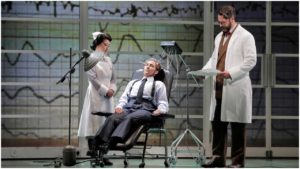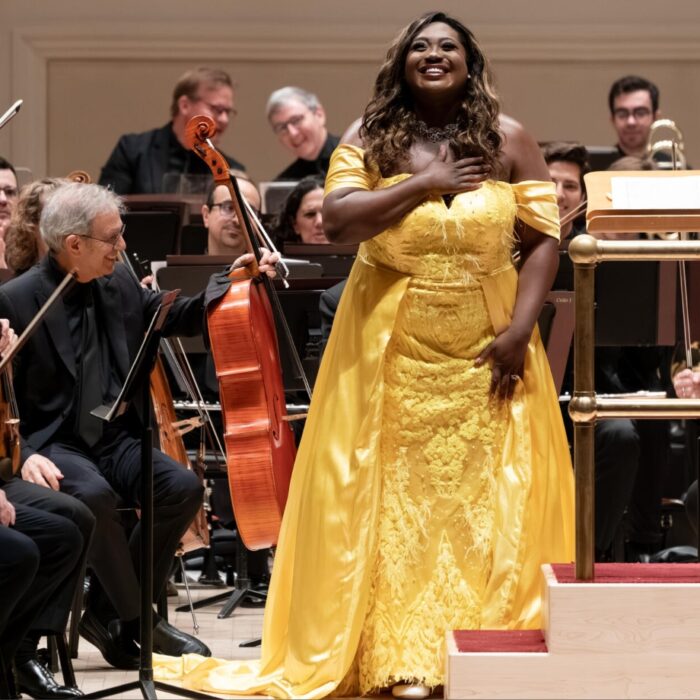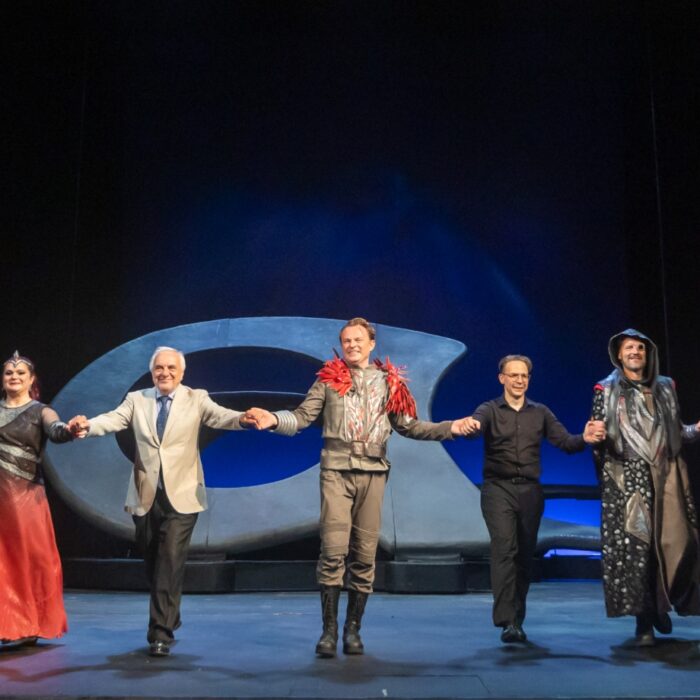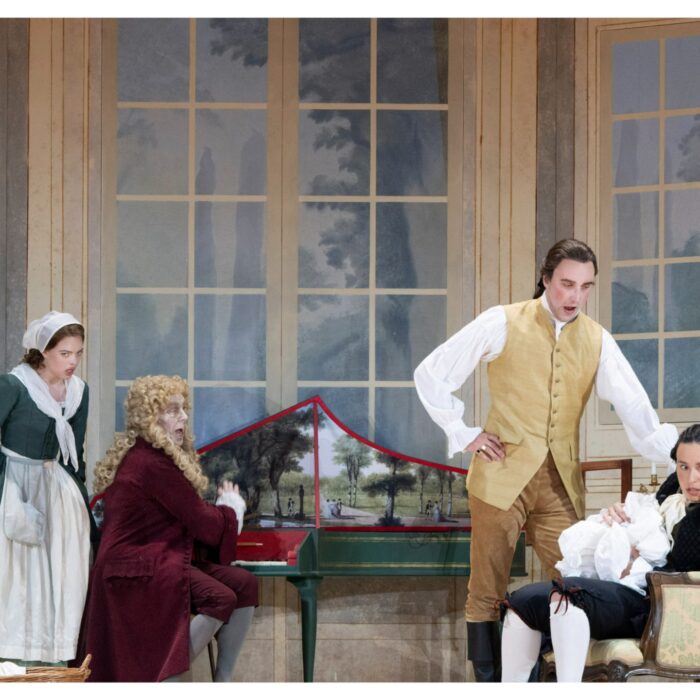
San Francisco Opera 2018-19 Review: Orlando
Handel’s Best Score Gets Solid Music Performance Despite Questionable Production
By Lois Silverstein(Credit: Cory Weaver / San Francisco)
San Francisco Opera’s “Orlando” was not like its poem of origin by Ariosto, “furioso” or “impassionato.” Rather, it was thoughtful performance, set during the London Blitz in WW II, where it brought together images of the disasters of war along with its chilling human side effects and provoked questioning and rethinking human values.
Originally set for Scottish Opera in 2011, also by Harry Fehr, this production likewise offers the beauties of Handel’s music, but also scales the heights of such a subject. The San Francisco production, however, did little to rouse high feelings, or even much excitement. Too much in the idea department? Perhaps. Fehr, making his San Francisco Opera Debut, brought quality direction to the SFO production; the result, however, seemed like more historical education than passionate illumination.
A Mild-Mannered Orlando
Five singers formed the centerpiece of the production and carried the substantial work load.
Mezzo-soprano Sasha Cooke sang with intelligence and care in the title role. She made a handsome young man, but her voice, while lustrous, lacked the power and passion the role required. Her “PTSD” version of madness seemed confined, perhaps beyond the formal structures the music itself required. Her facial expression, including her eyes, certainly conveyed the internal difficulties she was undergoing; however, her head and her body remained too restrained to convey the breakdown. Her presence on stage, directed mid and upstage rather than closer to the audience downstage, kept her struggle more distant. Her beautiful voice remained more hooded and constrained. When she stepped up to the famous aria, anticipation was high. Even the colorful slides and collages bursting like fireworks behind her, however, her commitment to the madness at hand seemed dilute.
This also happened during the finale when Orlando is supposed to have killed Medoro and Angelica, There, the sense of the character’s madness remained enclosed and cultivated rather than more high-energy, if not demonic. Fear and grief infused her vocal line but also without sufficient projected energy. Were it not for the frequent changing of costumes, on stage to boot, we might not have known in which phase Orlando was going through. The hallucinations, supposedly matched by the multiple colored projections behind the “hospital” were not differentiated and added to the muddle of events in Act three, and the final resolution of events.
Solid Counterparts
Christina Gansch, as Dorinda, ran the gamut of emotion, from “down-to-earth nurse,” gathering and carrying off hospital sheets; to heart-sick lover of Medoro; ambiguous/ambivalent friend to Angelica, her rival; and stalwart professional comrade to Zoroastro. Her voice soared and resonated with abundance. Ardent, energetic, full, and fevered, the rich tones moved the text to heart and back. She held the stage. We remained interested in what she was enduring as the narrative took to tormenting her. We cared about her fate, as she cared about Medoro, even though he wasn’t to be hers. Act II when desk duty kept her in the frame of the window, the “Nachtigall” aria, emphasized melancholic longing and excellent control of volume. She never let up.
Medoro, sung by Aryeh Nussbaum Cohen, offered a lustrous voice that eased over the complications of his love for Angelica and his appreciation and respect for Dorinda. “I would love you if I could,” was his downbeat. His voice remained contained in his easily liquid range, and remained a good example of the constancy and steadiness of his temperament.
Heidi Stober’s Angelica remained lovely, light and flexible, soaring, vivid and lucid; her physical presence too was more than affecting, both in duet with Medoro, with Dorinda and Orlando, shining like a gem in the fine bracelet. Particularly affecting was her prayer-like aria with its pleading, ascending and descending tones. The women’s duets as well as the trio with Medoro emphasized the intricate embrace and dazzling emotions Handel construed.
Christian Van Horn, as Zorastro, looked his part as modern magician, a.k.a. psychiatrist, and performed it with authority. His bass voice satisfied, his low notes plumbing the depths of feeling. The highs, on the other hand, missed their mark on occasion, but didn’t spoil the performance.
British Conductor, Christopher Moulds who also played harpsichord, led the orchestra with precision and zest. Moulds acknowledged as others have done, that it is Handel’s “greatest operatic score” and that it stands out with its unique insertion of trio and three duets, unique structural forms for Orlando himself, including the well-known Mad Scene, and stands out as bringing variety to the opera seria formHandel brought from Italy. It was Handel’s music indeed that offered the best of the day’s performance.
Slides & Projections
The slides and projections were a good technical addition although only partly inspiring, especially in their over-literalness, e.g., Edward VII’s abdication and his pro-Hitler sympathies at moment. Yes, they contributed to Orlando’s breakdown, and expressive of the cultural demise, but to return to our hero, Orlando, from 1937 Britain, was a lot to digest in musical minutes. So too the flashing lights that were to indicate Orlando’s hallucinations. The idea was effective but the splash made just that, a splash and pulled away from the feeling for his suffering.
So too the revolving stage. An effective piece of stage machinery and an apparent heir to the production elements in the original ones in Handel’s performance in the King’s Theater, in the 18th century, which had been an attraction to many audience members of earlier baroque operas, both comic and seria. Further, the shock treatments, over-literally detailed for the situation, forced attention from the main opera issues at hand. For a moment, it seemed a bit tasteless.
Orlando is a hero famous in history as Roland, and in art. He attracts because of his valor and courage. He draws people to him and he leads them to conquest and success. In San Francisco Opera’s production, too many factors led the hero into a less valiant role and more into being a player in a panorama of events, pertinent to the world in which they occurred. Of course, none of us can feel fully the depth of anguish and suffering of another. No question Sasha Cooke’s Orlando suffered. But when the emphasis is on the display of an idea – the Blitz, the bombing of London and Germany’s attempted destruction of that city- the symbolic equivalent of Orlando’s madness, the emphasis on heroism dissipates. Politically, this fits our times. We are less interested in heroes today, whatever our take on celebrities, than in the unfolding of the continuum of life and its socio-political nature. To splice the idea of heroic courage as destructive to human beings rather than exalting them was, however, an interesting take on the theme of love and the irrational.


